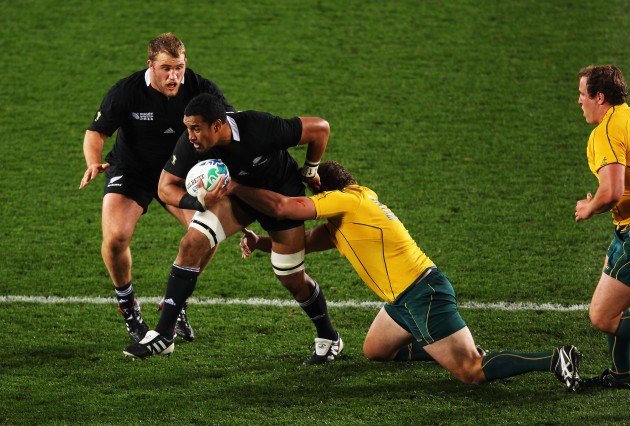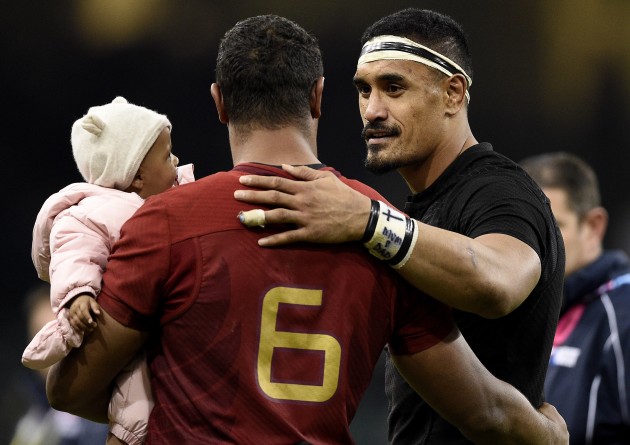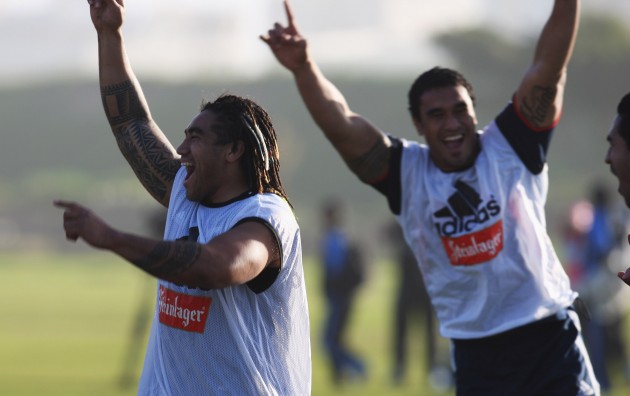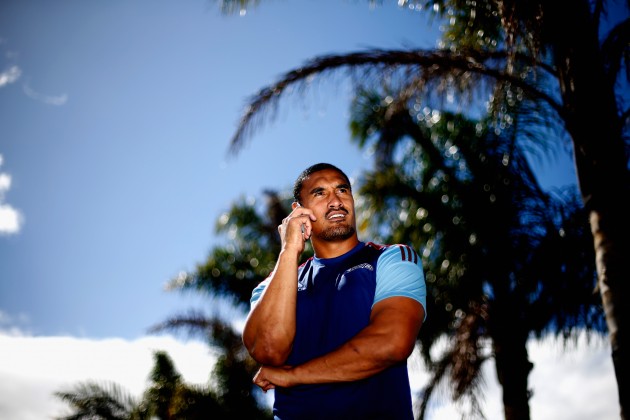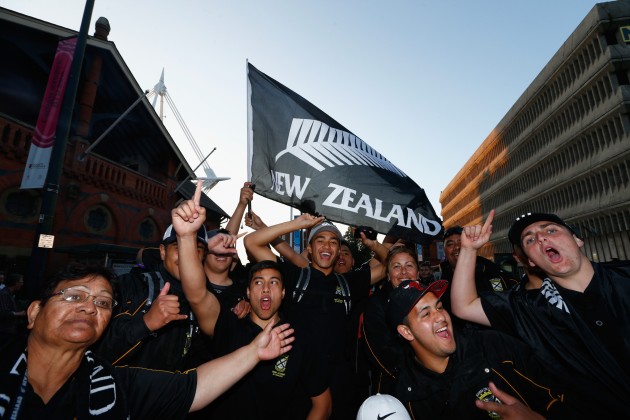All Blacks flanker Jerome Kaino opens up about pressure, drink-driving and defending a world title. By Patrick McKendry. This feature first appeared in the October 2015 issue of Rugby World.
IT WAS the middle of the 2011 World Cup when Jerome Kaino discovered just how much winning the thing meant to his fellow New Zealanders. In camp with the All Blacks, he received daily reports from his wife Di, who only needed to walk down the drive of their modern house on Auckland’s North Shore to collect the mail to gauge the mood of neighbours and those further afield. Their letterbox would be stuffed fit to bursting with letters, cards and, occasionally, gifts from those wishing him and the team well as the tournament entered the knockout stages.
The Kainos took heart from the thoughtfulness of people they had never set eyes on before, but there was another side to it which they can joke about now. What would have happened if the All Blacks had lost that final to France, instead of scraping home 8-7? Di reckons moving countries would have been a good option such was the importance placed on winning back the cup after 24 years by those who knew exactly where the couple and their two young children lived.
Public property? You could say that. It’s something they have become used to, as just about every All Black has. In the small, rugby-obsessed country, you’re never far from someone representing the nation in the black jersey. It’s more a couple of degrees of separation than six. Winning the Webb Ellis Cup after many years of disappointment and, at times, grief at the four-yearly failures had also become a non-negotiable.
As the All Blacks prepare for their title defence, Kaino talks of his 2011 memories. “The main one is winning it, obviously, but also all the support from the Pacific Island nations – the Tongans, Samoans, Fijians – that was a huge thing. Obviously having Richie (McCaw) and Kieran (Read) unavailable for the first few Tests, I think that’s what brought a lot of steel to us loose forwards. Having them back just added to that competition among us. Also, the pressure on us to perform – that was massive.
“It got bottled up during the week of that semi-final (against Australia). There was a lot of nervous energy building up to that. Because we lost to them in Brisbane in our final Test before the World Cup, that added to it. By the end of that game everyone felt like we’d won the grand final – there was such a relief we had beaten them. It was a huge hurdle to get over that game and prepare for the (actual) grand final. It was quite stressful having to refocus after every game and having that expectation thrown on you week in and week out was pretty crazy.”
Kaino, the ironman of the tournament for his ability to play just about every minute apart from the final couple of the semi-final victory over the Wallabies, was the glue that bound the All Blacks loose forwards together. With Read out for the first couple of matches and McCaw playing on a broken foot, it was up to Kaino to lead the physical battle, alongside old warhorse Brad Thorn.
One of Kaino’s standout moments was his tackle on Wallaby Digby Ioane in the semi-final when, with New Zealand leading 8-0 and Ioane seemingly about to score a stunning try, Kaino picked up the wing and drove him back. It looked more like a wrestling move than a tackle, but it was mightily effective. While the Aussies slotted a penalty awarded from the resulting ruck, Kaino’s desperate tackle stopped the Wallabies in their tracks and also sent an inspirational message to his own team: losing this match is not an option.
He reckons his poorest game was the final – one of his clearest memories of the game was dropping a France 22m restart – but both McCaw and coach Steve Hansen think he was the player of the tournament, if not the year. Instead, inspirational France skipper Thierry Dusautoir was given the Player of the Year accolade.
THE 32-year-old, who was born in American Samoa and arrived in New Zealand with his family aged four, has been in a reflective mood lately. Part of that is due to the fact he has just released his autobiography My Story, in which he details his humble upbringing in Papakura,
a working-class suburb of South Auckland, and the other reason is the impending defence of a cup for which he and his team-mates had to dig so hard to win last time out.
Kaino was a self-confessed skinny kid growing up with five siblings. His mum Velonika didn’t want him to play rugby because she didn’t want him to get hurt (his nickname at home was ‘Aunty’ for his willingness to change nappies and help with household chores). And sure enough a broken collarbone in his first season at senior school almost saw him give the game away. Dad Sa had other ideas, however, after seeing his son show promise.
He is now known for his bone-crunching defence and steamroller ball-carrying, but Kaino started out as a back, pitching up at centre or full-back before going to St Kentigern College on a scholarship. Once his new coach encouraged him to play at loose forward, Kaino’s career flourished and he was an All Black by the age of 21.
Some tough years followed. Issues with alcohol after becoming, in his words, an All Black too young led to a drink-driving conviction in 2008 following a couple of years out of international favour. Kaino admits in his book that his drinking would sometimes keep him out until 7am on the day of training with his Blues Super Rugby team, writing: “Because I was so fit I felt I could get back up the next day and train and then sleep it off and recover before the next game came around.
“Looking back, it was already getting out of control by 2006 and 2007 during the Blues and Auckland seasons, but I didn’t see anything wrong with it. I thought it was absolutely normal and, of course, I was having a lot of fun doing it.
“I would get hangovers, but if I had to do something the next day – training, for example – I would guts it out and get through it. If it was a day off, I pretty much spent it in bed. A lot of people would have known I was hungover. Sometimes I would make excuses for stuff I was supposed to do and not turn up at all.”
The drink-driving conviction following a minor crash on the morning after a heavy session – for which he was fined and lost his licence for six months – was a wake-up call, as was the birth of his daughter, Milan, in 2009. He promised the All Blacks he would stay off the booze for the rest of 2008 and now he just has the occasional beer.
“I felt like I had arrived as a rugby player and the drinking and partying was something that went with it. It was something I enjoyed, but it had to stop,” Kaino says now. “Di and I went through some dark times, but we came out of them stronger. I still have a beer at a barbeque or after a Test, but I’m never out all night like I used to do in my twenties. Family comes first.”
HE HAS become used to overcoming challenges – from a childhood in a rented house which was constantly burgled, to occasionally relying on food parcels, to the court appearance. From that adversity has come a mental and physical steel, however, and that will be necessary in England and Wales over the next few weeks. While he has been looking back at his origins and past glories, Kaino is determined to add a new chapter before the year is out.
He is picking England, Wales and Ireland to be among the best performing teams at the World Cup. England because of home advantage and their pack, Wales because of their excellent loose forwards, including captain Sam Warburton, and Ireland because of the way they are playing as a team under Kiwi coach Joe Schmidt. The All Blacks haven’t forgotten how hard they had to work in Dublin in 2013 to avoid a first defeat to the Irish.
The All Blacks know they will face distractions in the UK. They expect the local media to have a crack in order to undermine them and for pressure to come from expectant former All Blacks now domiciled in the UK, as well as the millions of rugby experts back home.
“It’s going to be tough. Going to England during the end-of-year tours, they (public and media) ramp up the intensity on the team. It seems the media try to cause disruption with what they talk about. That’s going to be amplified with England hosting the tournament and us being champions. It won’t be easy but it would be pretty gratifying if we could come home with the trophy.”
Asked to clarify his point about the English media, he says: “You can pinpoint what they’re going to talk about – the haka and what we do (tactics legal and otherwise). We’ve spoken about it as a team – possible what-ifs – and the more prepared we are the better we’ll be.
“There’s a huge expat population over there in terms of Kiwis. That will add to the pressure, knowing what it means to them and knowing how much they are relying on us to get the job done, but the leaders and coaches have a good handle on it and we’ll be well prepared.”
As Kaino knows only too well, a nation expects.
This feature first appeared in the October 2015 issue of Rugby World magazine. You can purchase Jerome Kaino’s autobiography here.






